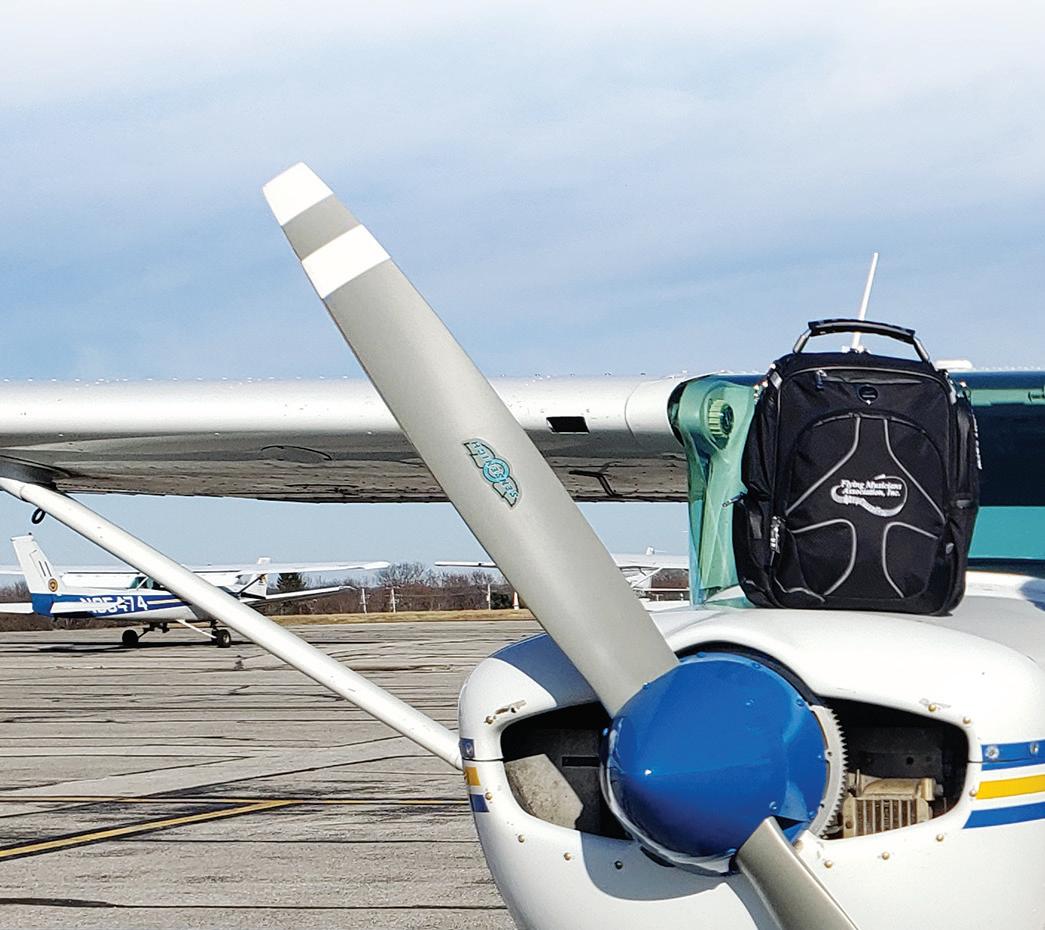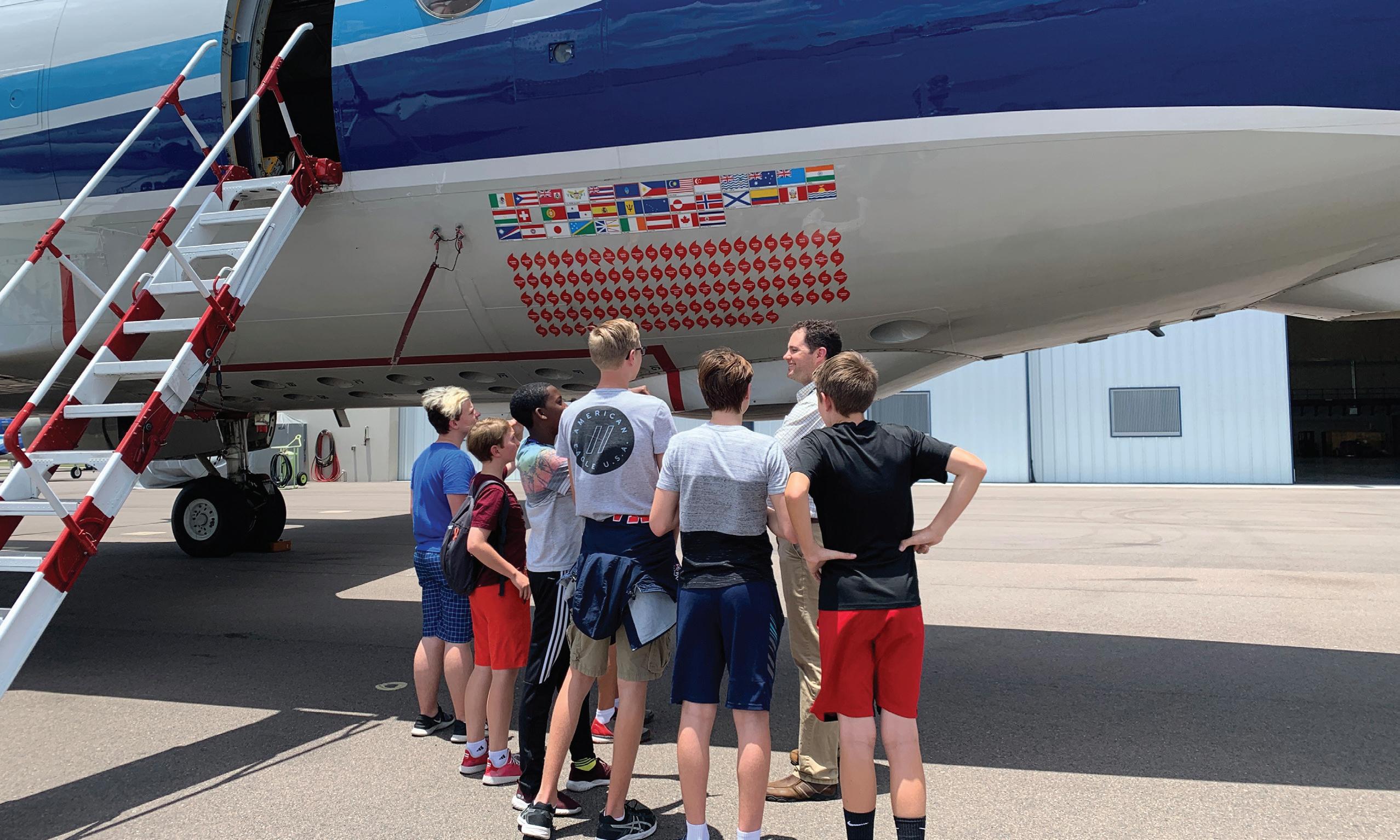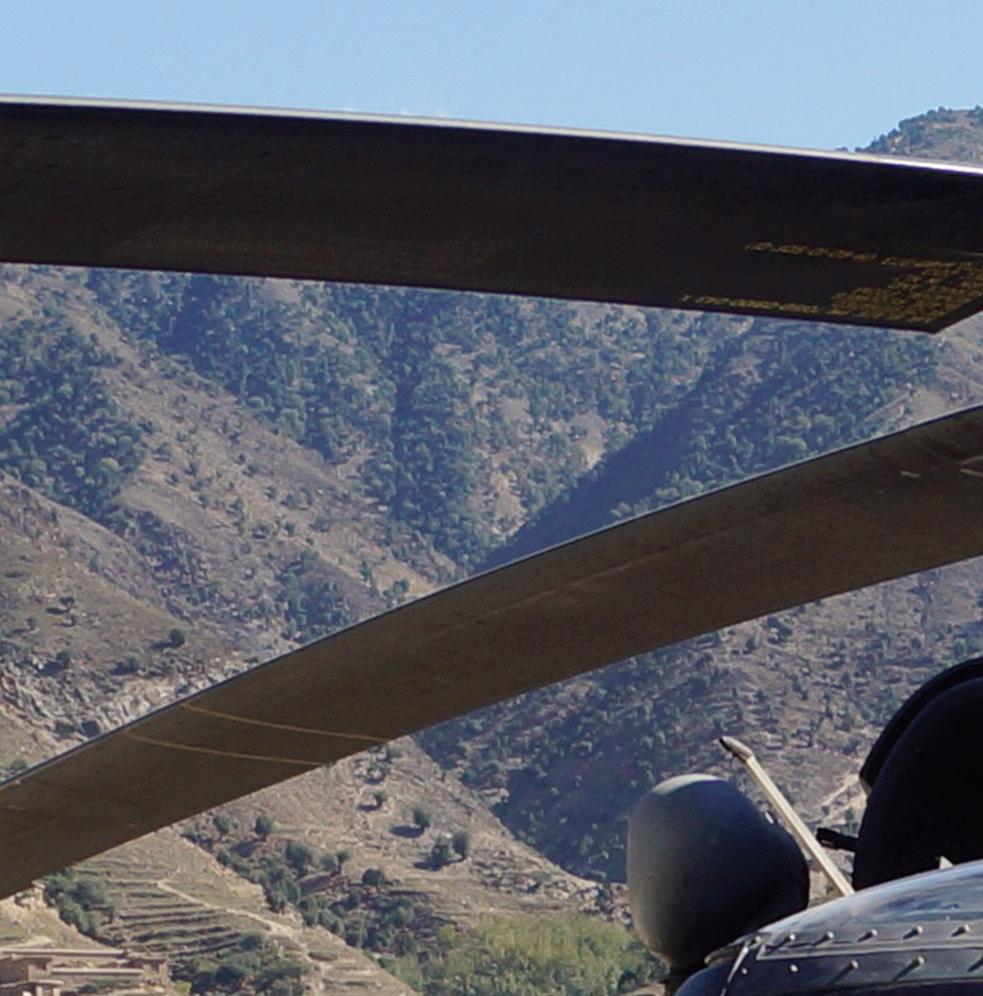
10 minute read
INSPIRING WOMEN IN AIRPORT MANAGEMENT
by Jill Meyers
Airport Management is a really exciting career that many young students don’t necessarily think about when pondering opportunities in aviation. It is a really awesome job, though. Not only do you get to be around airplanes and pilots all day long, but some airports are so big that it’s like running a small city! Less than 20% of airport managers are women, and I would like to introduce you to some very special ladies in this exciting career field.
Advertisement
But first, an overview of airports and the airport manager career. There are many different kinds and sizes of airports. In the United States, there are about 13,000 airports and 4,000 heliports (landing sites for helicopters). You may be surprised to find out that only 5,000 of these facilities are used by the public and only about 650 airports are served by commercial airlines! Most of the nation’s airports are used for General and Business Aviation. As an example, I live in New Mexico and if I asked you to look at a map and guess how many airports we have across the state, you may guess a number between 8 and 10. Well, there are actually 60 airports in New Mexico ranging from our largest airport, the Albuquerque International Sunport (airport code ABQ), to tiny dirt strips like Lindrith Airpark (E32).
Another interesting fact is that airports can be owned by municipalities, cities, counties, or states, and some are operated as privately owned businesses. Airport managers oversee the daily operations of an airport, ranging from enforcing Federal Aviation Administration (FAA) rules and regulations to negotiating airport contracts and leases. They may be responsible for supervising personnel, devising and implementing operating procedures, monitoring airport financial expenditures, and coordinating construction or renovation projects with municipal officials. Because of their level of responsibility, airport managers may be on-call so that emergencies or other unexpected issues that come up can be resolved quickly; this job can include evening and weekend shifts.
WHAT KIND OF EDUCATION IS REQUIRED TO GET INTO AIRPORT MANAGEMENT?
Airport managers usually hold a bachelor’s degree in airport management or a related field. These 4-year degree programs cover aviation science, aerodynamics, and physics, as well as airport economics, finance, and management. Students also take classes in FAA regulations, aviation safety, and air transportation operations. Some aviation management programs offer flight courses to prepare students for the FAA private pilot certification exam. Internship opportunities with government agencies, local airports, or commercial airlines may be offered as well.

CHELLIE CAMERON
Let’s introduce you to some of our nation’s finest women in airport management positions. Chellie Cameron is CEO of the Philadelphia International Airport (PHL) and the smaller Northeast Philadelphia Airport (PNE). Ms. Cameron oversees the management of airport personnel including approximately 800 Division of Aviation employees and 200 members of the Police and Fire Departments, among others. Before joining PHL, Ms. Cameron had 13 years’ experience working for the Metropolitan Washington Airports Authority (MWAA) in Washington, DC. Her experience also includes seven years as an active-duty officer in the United States Air Force and one year as an Air Force civilian employee.

KIM BECKER
Across the country in California, Kimberly Becker is President/CEO of the San Diego County Regional Airport Authority, owner and operator of San Diego International Airport (SAN). Her career in aviation and airport management spans more than 30 years. Prior to joining the Airport Authority, Ms. Becker served as Director of Aviation for the Mineta San Jose International Airport (SJC) from 2013-2017. Before that, she held increasingly responsible positions in San Jose for 18 years, including Chief Operating Officer and Assistant Director of Aviation. Earlier in her career, Ms. Becker held operations and environmental positions at Teterboro Airport, NJ (TEB) and at the Lockheed Air Terminal in California, now called the Hollywood Burbank Airport (KBUR).

NYIKA ALLEN
I was very lucky to have the opportunity to interview two of my friends who work in airport management but in very different and diverse capacities. Nyika Allen is not only the youngest Director of Aviation in the country (having been appointed to the role when she was 27 years old), but she is also the first millennial to lead a City of Albuquerque department and the first woman to serve as Director of the Department of Aviation.

MEADOW CHASE
Meadow Chase has a very unique airport management job in that she owns her own company called Chase Airport Management. Meadow is a contract airport manager with responsibility to manage two General Aviation airports in San Diego County, Ramona Airport (RNM) and Fallbrook Community Airpark (L18). I interviewed Nyika and Meadow together during a Zoom session in January. The best way to share their amazing stories and perspectives with our readers is to provide excerpts of the interview.
JILL: NYIKA AND MEADOW, TELL US WHAT YOUR ROLE IS, AND THE SCOPE OF YOUR ROLE, SINCE YOU MANAGE VERY DIFFERENT KINDS OF AIRPORTS.
MEADOW: I have Ramona and Fallbrook, and what’s different about them is that the airport management staff is contracted through the County. I do have my company, Chase Airport Management, that manages the two and supplies the staffing.
NYIKA: You’re lucky - you get your own private sector airport there! You don’t have to deal with the bureaucracy… well, maybe not as much!
MEADOW: As far as the flow of the company, it’s a lot less bureaucratic because it’s obviously just me! The airports are General Aviation use. To give you an idea of size, Fallbrook has about 21,000 operations a year. Ramona is a little bit different, typically with around 120,000 operations, and it also has Cal Fire and the Forest Service.
NYIKA: Our General Aviation airport, Double Eagle II, has one Fixed Base Operator (FBO) and some companies onsite, and is actually a busy little airport with some military use. Our main airport, the Albuquerque International Sunport, is actually a joint use facility with Kirtland Air Force Base but we maintain the whole airfield. It’s the largest airport in New Mexico, and I think one of the great joys of our state. It’s such a unique little airport. It’s really historic and you can see the culture of Albuquerque and New Mexico shine through. Before COVID we had about 5 million passengers a year, with nine commercial airlines. We have two FBOs at the Sunport, Cutter Aviation and Atlantic, and we manage about 250 active contracts and leases, and our budget is around $50M per year.
JILL: I REMEMBER THE DAY I MET YOU, NYIKA, ABOUT FIVE MONTHS AFTER YOU STARTED THIS JOB IN 2018. I KNOW THIS JOB IS YOUR FIRST IN AVIATION – TELL US ABOUT WHAT YOU DID BEFORE THIS?
NYIKA: I didn’t know anything about airports when I started in this job! And it took me a full two years to really get into it, and I still learn new things every single day and am not done learning. Before this, I was running a really small non-profit called the New Mexico Technology Council. I did lobbying for the technology industry and workforce development. But my love for STEM (Science, Technology, Engineering and Math) has helped me in aviation and in this role.
JILL: MEADOW, TELL US HOW YOU GOT INTO AVIATION.
MEADOW: When I was around 14 years old, I watched the movie “Top Gun” and turned to my dad and said, “I really want to be a pilot!”, and he said to go for it! But I didn’t quite know how to get my foot in the door and didn’t know how to get into aviation. I started volunteering at an air museum in Ramona at the age of 16, and on my second day there, a job came available refueling tanker aircraft at the local FBO. And through networking, it kind of snowballed into getting into airport management.
JILL: TELL US ABOUT YOUR FLYING, MEADOW!
MEADOW: I do not leave this airport! Obviously! I did my flight training here, got my first job here, and got this job. I worked on my private pilot’s rating and am now working on my instrument which has been quite the journey. I’m sure you can relate, Nyika, that with this job, finding the time for anything is so hard. I’ve been working on my instrument rating for 2-3 years and am getting close to the end, finally. And then I’ll go for my commercial rating.
JILL: WHAT ARE THE THINGS YOU LOVE MOST ABOUT YOUR JOB?
MEADOW: Nyika, I think you could probably agree with me on this – I think the people are absolutely amazing. I mean, you meet so many people. It’s kind of like a family.
NYIKA: Yeah. Amazing people, even in other parts of the industry like at the airlines, or dealing with the FBOs, pilots, and getting to meet you! I love my staff too. Comprehensively, I’ve never met a team of harder working people that all are working towards the same goal. So, I agree with you, Meadow! I also love the amount of innovation I can bring into my job.
JILL: AND WHAT THINGS ARE THE HARDEST AND MOST CHALLENGING?
NYIKA: There is a lot of bureaucracy working for the city. I am always jealous of airport directors who work in private industry or for an airport authority. But there’s not really anything I don’t like about my job. Some days are harder than others and some emotionally taxing.
MEADOW: Some people have a perception about women in aviation, especially young women. So as a young woman with an already challenging job, there are some more challenges that might be faced, specifically in that not everyone may believe you can do the job, or they think that it came easy to you or is easy for you.
JILL: WHAT IS YOUR ADVICE TO YOUNG PEOPLE READING THIS ARTICLE WHO MAY WANT TO GET INTO AIRPORT MANAGEMENT?
NYIKA: My first advice is to use your connections and network. Also, I think when you are young and not as certain of your exact path yet… let’s just say that I was a “yes” girl. I said yes to everything, which meant I got to try a lot of stuff and meet a lot of people, and it got my name out there. As I got older, then, I finally was able to say “no” and properly curate my life and say “OK, I didn’t like that”, and therefore you never have to agree to it again. But you try it once and see what you think of it, and then you can start to shift and make changes to your life, and that’s how you build the life that you want to have. If you already know what you want to do, that’s awesome, but I never was that person. My advice is never be scared to do anything, because you can make yourself as big as you want to be.
MEADOW: So, I’m kind of the opposite of you, Nyika! I wouldn’t say I’m a “yes” person. Obviously, I will do anything for my job. No task, I believe, is too small or too insignificant. I’m not a “no” person, but when I had an idea to go into aviation, I was going to be a pilot. That’s all I was going to be, but financially, that’s a lot of money. I was hesitant to try anything that wasn’t flying. So, when I got my first job as a lineman, fueling aircraft, I absolutely loved it. And the same thing happened when I was offered a job as assistant airport operations, which I wasn’t sure I wanted either. My advice would be to be willing to start at the bottom and work your way up. Be willing to start somewhere that you don’t see yourself starting. Because it’s actually really hard sometimes to break away from what you originally had in mind in aviation.
NYIKA: I love how ours are completely opposite – I think that’s so cool, because it does show how you can be coming from two different spots. You were so focused and I was so unfocused, and how we’ve been able to come together and now do such similar things.
MEADOW: I think so too!
JILL: IS THERE ANYTHING WE DIDN’T COVER?
NYIKA: I want to encourage more women. We are all shattering glass ceilings. Don’t ever let someone tell you that you can’t do something.










